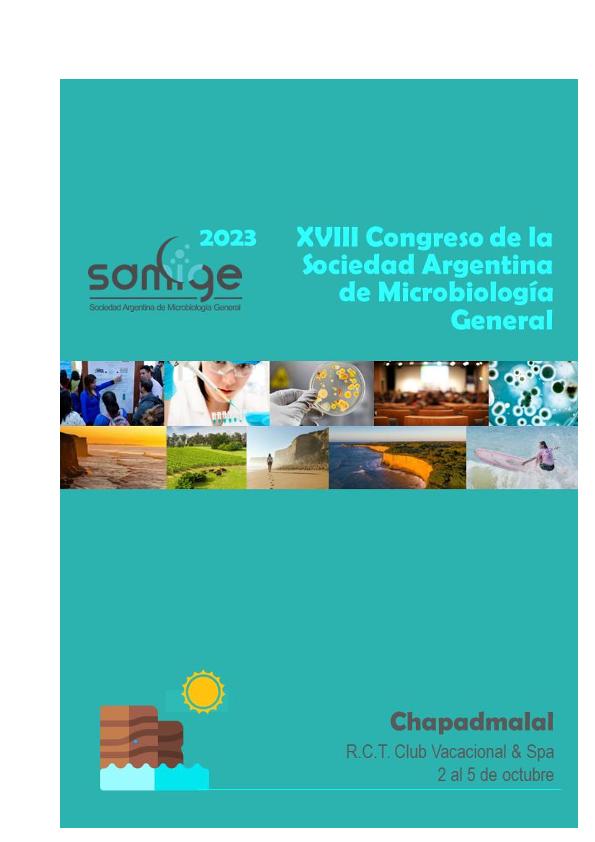Evento
Removal of polycyclic aromatic compounds by pseudomonas sp. P26 in an immobilized system on organic waste as culture and support medium. Influence of biostimulation with inorganic phosphate
Lobo, Constanza Belén ; Correa Deza, Maria Alejandra
; Correa Deza, Maria Alejandra ; Molina, Rocío Daniela Inés
; Molina, Rocío Daniela Inés ; Ferrero, Marcela Alejandra
; Ferrero, Marcela Alejandra ; Juárez Tomás, María Silvina
; Juárez Tomás, María Silvina
 ; Correa Deza, Maria Alejandra
; Correa Deza, Maria Alejandra ; Molina, Rocío Daniela Inés
; Molina, Rocío Daniela Inés ; Ferrero, Marcela Alejandra
; Ferrero, Marcela Alejandra ; Juárez Tomás, María Silvina
; Juárez Tomás, María Silvina
Tipo del evento:
Congreso
Nombre del evento:
XVIII Congreso Argentino de Microbiología General
Fecha del evento:
02/10/2023
Institución Organizadora:
Sociedad Argentina de Microbiología General;
Título del Libro:
Libro de Resúmenes: XVIII Congreso Argentino de Microbiología General
Editorial:
Sociedad Argentina de Microbiología General
Idioma:
Inglés
Clasificación temática:
Resumen
Microbial immobilization is a beneficial strategy that can ensure greater efficiency and persistence of microorganisms used in petroleum compound biodegradation processes. Natural organic supports for immobilizing microbial cells are cost-effective, biocompatible and biodegradable. Particularly, walnut shell is a hydrophilic, porous support with high wear resistance. The study objectives were: 1) to evaluate the immobilization of Pseudomonas sp. P26, an environmental bacterium that removes aromatic petroleum compounds, using walnut shell and a low-cost culture medium, and 2) to determine the removal of a mixture of dibenzothiophene (DBT) and polycyclic aromatic hydrocarbons (PAHs) by the immobilized system and planktonic cells, in the presence and absence of an inorganic biostimulant (KH2PO4). Pseudomonas sp. P26 was pre-cultured in LBm broth (24 h, 30°C, 180 rpm) and immobilized in bioreactors containing ground walnut shell (support) and a previously formulated low-cost culture medium (2.5% corn maceration water and 1% crude glycerol). This system was incubated at 30°C for 72 hours without agitation. Viable cultivable cell counts were performed, and metabolic activity was determined using the thiazolyl blue tetrazolium bromide (MTT) reduction technique to MTT-formazan. The removal of a mixture of PAHs (DBT, acenaphthene, fluoranthene, and pyrene; 0.2 mM each) by the immobilized system and control planktonic cultures was determined in JPP broth, with different concentrations of KH2PO4 (0 and 0.46%), after 7 days of incubation at 30°C and 100 rpm. Accumulation of inorganic polyphosphate (polyP) was determined by the colorimetric method of acid hydrolysis and subsequent reaction with phosphomolybdate in the presence of ferrous sulfate. Bioemulsifying activity was assessed by the non-polar solvent mechanical agitation method, and the remaining concentration of contaminants was measured using reverse phase high-performance liquid chromatography. The results of metabolic activity (15% conversion to MTT-formazan) and bacterial viability (1.9 x 107 CFU/g support) indicated that Pseudomonas sp. P26 was effectively immobilized in walnut shells using the formulated culture medium with industrial by-products. The highest removal percentages of DBT (33%), fluoranthene (23%), and pyrene (25%) were observed in the immobilized system compared to planktonic cells. The presence of inorganic phosphate did not significantly affect contaminant removal or bioemulsifying activity in both immobilized and planktonic cultures, while the highest intracellular accumulation of polyP was evidenced in planktonic cultures. The obtained results demonstrate that walnut shells, corn maceration water, and crude glycerol are organic waste materials that can enhance bacterial immobilization systems to be applied in the transformation of petroleum compounds in bioremediation or refining technologies.
Archivos asociados
Licencia
Identificadores
Colecciones
Eventos(PROIMI)
Eventos de PLANTA PILOTO DE PROC.IND.MICROBIOLOGICOS (I)
Eventos de PLANTA PILOTO DE PROC.IND.MICROBIOLOGICOS (I)
Citación
Removal of polycyclic aromatic compounds by pseudomonas sp. P26 in an immobilized system on organic waste as culture and support medium. Influence of biostimulation with inorganic phosphate; XVIII Congreso Argentino de Microbiología General; Chapadmalal; Argentina; 2023; 72-73
Compartir



